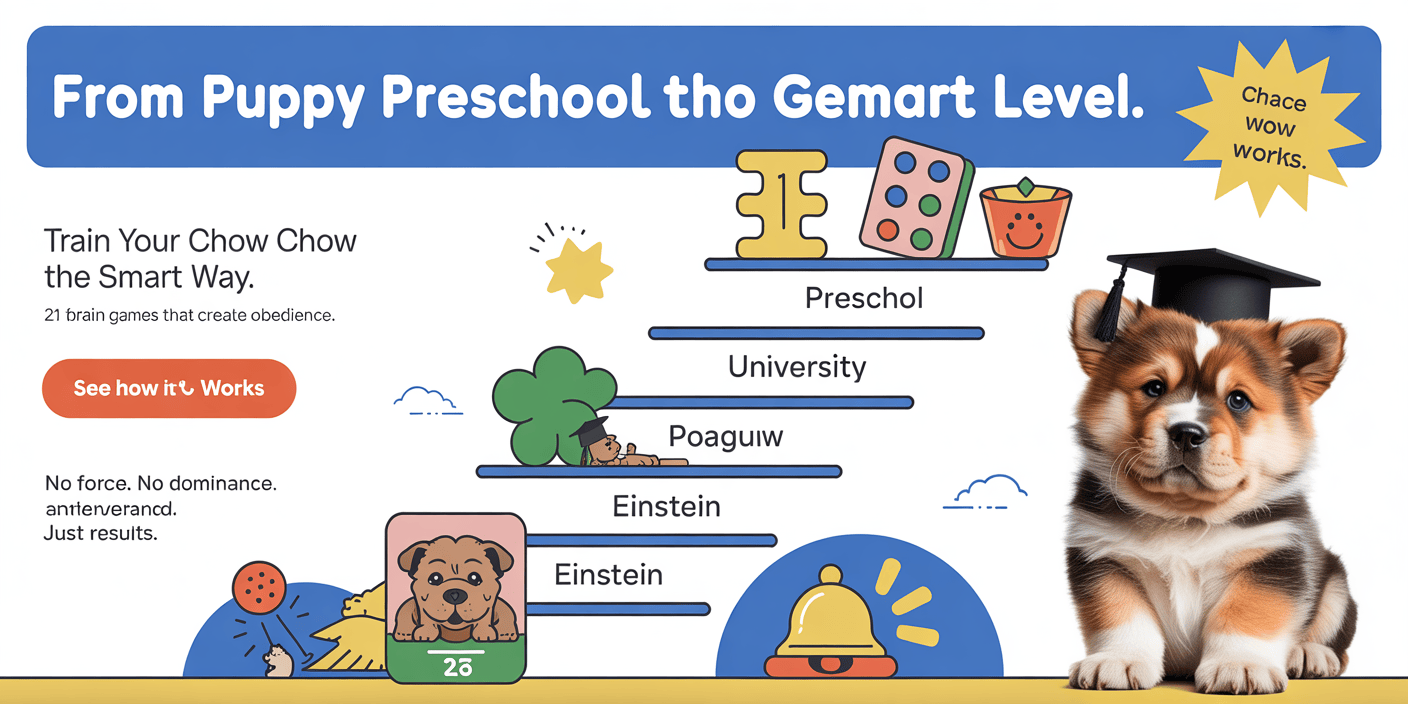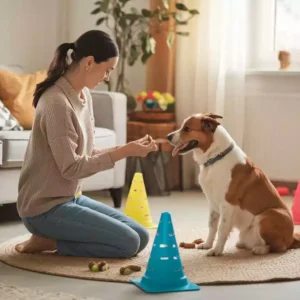Did you know that Chow Chows are one of the most unique and recognisable dog breeds, known for their distinctive appearance and loyal temperament? Training a Chow Chow puppy needs patience, consistency, and positive reinforcement. They can be stubborn, so early training is key for a well-behaved pet.
With the right puppy obedience training, your Chow Chow can become a calm and loving friend. This article offers a detailed Chow Chow puppy training guide. It includes 10 essential tips to start your training journey.
Key Takeaways
- Understand the unique characteristics of Chow Chow puppies
- Learn effective strategies for puppy obedience training
- Discover the importance of early socialisation
- Implement positive reinforcement techniques
- Address common behavioural challenges in Chow Chows
Understanding Your Chow Chow Puppy’s Unique Temperament
Knowing your Chow Chow puppy’s personality is key to training them well. Chow Chows have a special temperament that can be both rewarding and challenging. To train them effectively, you need to understand their unique traits.
The Independent Nature of Chow Chows
Chow Chows are known for being independent, often seen as aloof or cat-like. This makes them harder to train than some other breeds. Consistency and patience are crucial when training a Chow Chow puppy. They need a gentle yet firm approach to build trust and encourage good behaviour.
Breed-Specific Behavioural Traits
Chow Chows have certain behaviours that are important to know for training. They are protective, loyal, and sometimes stubborn. Understanding these traits helps you tailor your chow chow training techniques to meet their needs. This makes training more effective and enjoyable for both you and your puppy.
Setting Realistic Training Expectations
It’s important to have realistic expectations when training a Chow Chow puppy. Their independent nature and breed-specific traits mean training will take time. Setting achievable goals and celebrating small wins keep the training positive. It keeps you and your puppy motivated and engaged.
Essential Supplies for Successful Chow Chow Training
Training a Chow Chow puppy needs patience, consistency, and the right tools. It’s important to have the right supplies for your puppy’s needs.
Training Treats and Reward Systems
A good reward system is key to positive training. Treats help motivate your puppy to learn good behaviours.
Best Treat Options for Chow Chows
Choose healthy, safe treats for your Chow Chow. Freeze-dried liver or chicken strips are great choices.
Clicker Training Benefits
Clicker training uses a sound to mark good behaviour, followed by a treat. It helps your puppy learn faster and strengthens your bond.
Appropriate Collars, Harnesses, and Leashes
It’s important to pick the right collar, harness, and leash for walks. A well-fitted harness is best for Chow Chows to avoid neck strain.
Training Tools and Interactive Toys
Using Chow Chow training tools and toys can make training more fun. Puzzle toys and treat-dispensing toys are great for keeping your puppy engaged and preventing boredom.
Experts say, “Positive reinforcement is key to successful puppy training.” With the right supplies and techniques, you’ll raise a well-behaved Chow Chow.
Establishing a Consistent Training Schedule

To raise a well-adjusted Chow Chow, a consistent daily training routine is key. Chow Chows are independent and need a structured schedule. This helps them understand what’s expected, reducing confusion and behavioural issues.
Daily Training Routines for Puppies
Daily training for Chow Chow puppies should be short and fun. Sessions should last 10-15 minutes, several times a day. Start with simple commands like “sit,” “stay,” and “come.” As they grow, add more complex commands.
Play and rewards make training sessions fun. This keeps your puppy eager to learn. A routine that includes feeding, exercise, and sleep is also important. It helps your puppy feel secure and develop good habits.
Age-Appropriate Training Milestones
Knowing when to teach certain skills is crucial. Puppies under 12 weeks can start with basic commands. Between 3 and 6 months, introduce more complex commands and socialisation. As they grow, use praise and affection instead of treats.
Balancing Training with Rest and Play
Training is important, but so is rest and play. Chow Chow puppies need time to relax and recharge. Too much training can make them tired and less willing to learn.
Make sure your puppy has enough time for play and quiet rest. This balance prevents burnout and keeps them excited about training.
With a consistent training schedule, daily routines, and enough rest and play, you’ll raise a well-behaved Chow Chow.
How to Train Chow Chow Puppy Behaviour Tips: The Foundation
To raise a well-behaved Chow Chow, start with the right tips from the beginning. Training a Chow Chow puppy needs patience, consistency, and positive reinforcement. By focusing on foundational tips, you can help your puppy succeed and build a strong bond.
Tip1: Early Socialization Techniques
Early socialisation is key for Chow Chow puppies. It introduces them to various environments, people, and animals. This helps prevent anxiety and aggression later on.
Exposure to Different People
Introduce your puppy to many people, like different ages and ethnicities. This makes your puppy confident and calm around strangers. Take your puppy on walks, visit dog parks, and have guests over.
Introduction to Various Environments
Take your puppy to different places, like parks and pet stores. This makes them adaptable and less reactive to new places. Start with short visits and increase time as they get more confident.
Tip2: Establishing Clear Boundaries
Setting clear boundaries is crucial for your puppy’s growth. It helps them know what’s expected and prevents behavioural issues. Be consistent and make sure everyone agrees on these boundaries.
Tip3: Consistency in Commands and Cues
Consistency is essential in training your puppy. Use the same commands and cues every time. Ensure everyone in the family does the same. This avoids confusion and reinforces what your puppy learns. Be patient and persistent, as consistency leads to the best results.
Basic Obedience Training for Chow Chow Puppies

Basic obedience training is key to raising a well-behaved Chow Chow puppy. It helps manage their behaviour and strengthens your bond. By focusing on key commands and techniques, you can raise a Chow Chow that is obedient and well-adjusted.
Teaching Sit, Stay, and Come Commands
Teaching your Chow Chow puppy to sit, stay, and come is essential. Start by holding a treat above their head and moving it back towards their tail. As they follow the treat, their bottom will lower into a sitting position. Say “sit” and give them the treat once they’re in the sit position. Repeat this until they learn the command.
For the “stay” command, have your puppy sit, then take a few steps back while saying “stay.” Gradually increase the distance and time you’re away. Reward them for staying in position. The “come” command is taught by calling their name, followed by “come” in an upbeat tone, and rewarding them when they respond.
Leash Training Without Pulling
Leash training is vital for walks and outings. To avoid pulling, start by letting your puppy get used to wearing a harness. Practice walking with them on a leash in a controlled environment. If they start pulling, stop moving forward. When they come back to your side, continue the walk. This teaches them that pulling doesn’t get them where they want to go faster.
Crate Training for Security and Comfort
Crate training gives your Chow Chow puppy a sense of security and aids in housetraining. Introduce the crate gradually, starting with short periods and increasing the duration. Make the crate a comfortable space by adding a soft bed and some toys. Your puppy will learn to see the crate as their own den, reducing anxiety and preventing destructive behaviour when left alone.
| Training Aspect | Description | Benefits |
|---|---|---|
| Sit, Stay, Come Commands | Teaching basic obedience commands | Improves responsiveness and behavior |
| Leash Training | Training to walk on a leash without pulling | Makes walks more enjoyable and safe |
| Crate Training | Introducing a crate as a safe space | Enhances security and aids in housetraining |
Advanced Behaviour Modification Techniques

Advanced behaviour modification is key for Chow Chow puppies with issues like resource guarding and territorial behaviour. As your puppy grows, you might face behaviours needing more complex training. These advanced techniques help your Chow Chow become calm and well-adjusted.
Tip4: Addressing Resource Guarding
Resource guarding is common in many breeds, including Chow Chows. It’s when your puppy guards its food, toys, or other valuable items. To tackle this, you’ll need to use training and desensitisation methods.
Food Bowl Training
Begin by gradually introducing yourself while your puppy eats. Start small, like standing near them, then touch their food bowl while saying calm words. Reward them for staying calm.
Toy Sharing Exercises
Teach your puppy to share by offering trade opportunities. For example, give a treat for a toy, praising them when they drop it. This teaches them that sharing is good.
Tip5: Managing Territorial Behaviour
Chow Chows are naturally protective. To manage this, socialise your puppy a lot. Introduce them to different places, people, and animals. This makes them confident and calm in new situations.
Tip6: Reducing Excessive Barking
Excessive barking can be fixed by finding the cause. If it’s boredom or too much energy, give them enough exercise and mental stimulation. For barking from outside stimuli, desensitisation works well.
Using these advanced techniques, you can help your Chow Chow puppy overcome tough behaviours. They’ll become a well-behaved companion.
Socialisation Strategies for a Well-Adjusted Chow Chow

Chow Chow puppies need careful socialisation to become confident and calm. Socialisation helps them grow into well-adjusted adults. This way, they won’t be fearful or aggressive in new situations.
Effective socialisation means exposing your puppy to different environments, people, and animals in a positive way. This makes your Chow Chow confident in new places and lowers the chance of behavioural problems.
Tip7: Safe Exposure to Other Dogs and Pets
Introduce your puppy to other dogs and pets slowly and under watch. Start with friendly and calm dogs. Positive reinforcement with treats and praise helps.
Watch your puppy’s body language closely. If they seem stressed or scared, slow down the introduction.
Tip8: Positive Interactions with Strangers
Chow Chows can be protective, so socialising them to strangers is key. Begin by having friends and family visit and interact with your puppy. Encourage them to offer treats to make strangers positive.
Handling Stranger Anxiety
If your Chow Chow is anxious around strangers, stay calm and patient. Start with them from a distance to help them get used to it.
Greeting Protocols
Teach your Chow Chow a greeting protocol, like sitting calmly before being petted. This helps manage interactions with strangers. Consistency is important for good manners.
Tip9: Navigating Different Environments
Take your Chow Chow to various places like parks, pet stores, and different indoor settings. Keep the first visits short and positive to avoid overwhelming them.
A well-socialised Chow Chow will stay calm in new places. Here’s a table with key socialisation strategies:
| Socialization Strategy | Description | Benefits |
|---|---|---|
| Safe Exposure to Other Dogs | Gradual introduction to friendly dogs | Reduces aggression and fear |
| Positive Interactions with Strangers | Reduces protective behaviour | Reduces protective behavior |
| Navigating Different Environments | Exposure to various settings | Increases adaptability |
Troubleshooting Common Chow Chow Behaviour Problems

Training your Chow Chow puppy comes with its challenges. You might face stubbornness, separation anxiety, and destructive chewing. It’s important to tackle these issues to ensure your puppy grows into a well-behaved and calm friend.
Tip10: Addressing Stubbornness with Patience
Chow Chows are known for their independent nature, which can seem stubborn. Patience is key when dealing with this trait. Remember, your puppy isn’t being defiant; they’re just following their instincts.
To tackle stubbornness, consistency and positive reinforcement are crucial. Make sure everyone in the family uses the same commands and rewards. This avoids confusion for your puppy. Reward good behaviour with treats and praise, encouraging them to repeat the desired actions.
Managing Separation Anxiety
Separation anxiety is common in many breeds, including Chow Chows. It shows when your puppy gets upset when left alone. To manage this, start by gradually increasing the time you’re away from your puppy, beginning with short periods.
Leave a comfort object with your puppy, like a t-shirt that smells like you, to offer reassurance. You can also create a calm environment by playing calming music or using a white noise machine.
Preventing Destructive Chewing
Destructive chewing is natural for puppies but can be frustrating for owners. To prevent it, provide your puppy with plenty of appropriate chew toys. Change these toys regularly to keep your puppy interested.
Keep a close eye on your puppy, and when you catch them chewing on something they shouldn’t, calmly redirect them to a good chew toy. Consistency and supervision are key to stopping destructive chewing.
By understanding and addressing these common behaviour problems, you can help your Chow Chow puppy become a well-adjusted and calm companion. Remember, patience and consistency are essential in the training process.
🧠 Ready to Unlock Your Chow Chow Puppy’s Hidden Intelligence?
Discover Adrienne Farricelli’s Brain Training for Dogs – the science-based, gentle, and effective dog training system by a certified professional dog trainer!
🐶 Why You’ll Love This Program:
- ✅ Unleashes your pup’s natural intelligence to stop bad behaviour fast
- ✅ 100% gentle, force-free, and science-backed methods
- ✅ Works on all breeds — even stubborn ones like Chow Chows
- ✅ Step-by-step videos, guides & support included
- ✅ Solves barking, chewing, leash pulling, whining, and more!
👉 Transform your Chow Chow into a well-behaved, happy companion starting today!
🎯 Click Here to Start Brain Training Now!
Conclusion: Raising a Well-Behaved Chow Chow Companion
Training a Chow Chow can be very rewarding. By using the tips from this guide, you can raise a well-behaved pet. Remember, patience, consistency, and positive reinforcement are essential.
Early socialisation and clear boundaries are key. Consistent commands help shape your Chow Chow’s behaviour. Positive reinforcement training encourages good behaviour and avoids bad.
By following these tips and sticking to your training plan, you’ll raise a well-behaved Chow Chow. With time and effort, you’ll have a strong bond with your pet. Enjoy a happy and healthy relationship with your Chow Chow.
FAQ
What is the best age to start training a Chow Chow puppy?
Start training your Chow Chow puppy at 8-10 weeks old. They are most open to learning at this age.
How often should I train my Chow Chow puppy?
Train your puppy every day. Use short sessions of 10-15 minutes. This keeps them focused and avoids feeling overwhelmed.
What are the most effective training methods for Chow Chow puppies?
Positive reinforcement works best for Chow Chow puppies. Use clicker training and rewards to encourage good behaviour and strengthen your bond.
How can I socialise my Chow Chow puppy to prevent behavioural issues?
Socialisation is key for Chow Chow puppies. Introduce them to different places, people, and animals early. This helps them feel confident and calm in new situations.
Why is consistency important in training a Chow Chow puppy?
Consistency is crucial for training a Chow Chow puppy. It helps them understand what’s expected and prevents confusion. This makes training more effective.
How can I address resource guarding in my Chow Chow puppy?
Teach your puppy “drop it” and “leave it” commands. Gradually increase their tolerance to losing their resources.
What are some tips for leash training a Chow Chow puppy?
For leash training, start with short sessions. Use positive reinforcement and avoid pulling on the leash. This helps avoid negative associations.
How can I prevent destructive chewing in my Chow Chow puppy?
Provide plenty of chew toys and supervise closely. Redirect their attention to acceptable chew items when needed.
Can I use punishment-based training methods for my Chow Chow puppy?
No, punishment-based methods are not recommended. They can cause fear, anxiety, and aggression. Focus on positive reinforcement instead.
How long does it take to train a Chow Chow puppy?
Training a Chow Chow puppy takes patience and time. With consistent effort, you can develop good behaviour and a strong bond. Training can take several months to a year or more.






